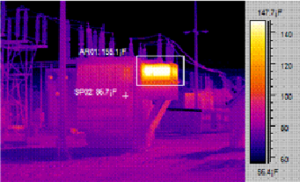































If you are like many attendees visiting Cisco Live US 2014 this year, you've probably experienced at least one or more power failures that significantly impacted the quality of your life and work lasting for days or weeks. We frequently read about the impacts of power failures, but unless you work in the utility industry you probably have never heard in detail about why and how problems occur and what can be done to prevent them.
 Thermal Pattern of Utility Substation indicating a problem, Photo courtesy of Brady Inspections, Inc.
Thermal Pattern of Utility Substation indicating a problem, Photo courtesy of Brady Inspections, Inc.According to industry subject matter expert, James Brady, Level III Certified Infrared Thermographer, Brady Infrared Inspections, Inc., the applications of infrared/thermography can help to easily identify and solve many problems in 1) power plants, 2) substations, and 3) transmission and distribution equipment that can prevent outages, improve safety, security and reliability of services while also helping to prevent injuries to utility workers and citizens.
While most utility companies have active maintenance programs to conduct inspections of transformers, switches, oil-filled tank equipment including breakers, voltage regulators, lightning arrestors, feeder lines, get-a-way poles and other equipment, they frequently do this only periodically, not continuously across all their operations since they do not have the resources, expertise or tools. Today this is changing even more rapidly as new technologies such as infrared are allowing for greater situational awareness. As James Brady points out in his articleInfrared Inspection of Electric Utility Equipment: Documenting Common and Not-So-Common Thermal Exceptions,"the bottom line is infrared is a powerful tool that can identify problems quickly, accurately, and safely in the electrical utility industry."
 A Warm Utility Pole Lighting Resistor, Photo courtesy of Brady Inspections, Inc.
A Warm Utility Pole Lighting Resistor, Photo courtesy of Brady Inspections, Inc.Using infrared is a great example of a technology that can be enabled in sensors such as thermal cameras, to help utilities more effectively identify, detect and prevent problems. Imagine if utilities could more easily harness the power of infrared technology across their operations. This is the opportunity of what is possible with the Internet of Things (IoT) and why so many IT and operational technology industries are excited about the benefits that are available.
So, today,what do you think most detracts utilities, or any businesswith similar operational needs, fromdeploying new technologies such as infrared more pervasively to optimize the utilization of their assets?
A) Lack of expertise?
B) The cost of deploying the technology economically everywhere it is needed?
C) The shortage of and abilities of people to make decisions quickly enough?
D) All of the above?
If you answered D), you are correct. In fact, one of the most important series of demonstrations that you must see at Cisco Live 2014 is the Internet of Things (IoT) demos that will show how utility companies and other businesses are able to overcome these types of limitations and why and how IoT addresses the challenges above.
Imagine if you and your company had the tools, technologies and experience to more easily see everyday
 IoT requires distributed Fog Computing
IoT requires distributed Fog Computingcommon and not so common problems and prevent them before they occurred, for example, to prevent power outages, save lives, and deliver improved products and services to customers. The good news is that it's possible today because of the Internet of Things (IoT). IoT is one the most IT and operational technology (OT) relevant developments in the evolution of the Internet. With the introduction of Fog Computing enabled by Cisco's IOx architecture that allows for an open framework for applications, interfaces, and devices as well as the distribution of IT to OT environments, IoT is changing the game.
 Introducing IOx
Introducing IOxIntelligent IoT network devices such as the Cisco Connected Grid Router 1000 Series, or the 800 Series Industrial Routers, or other devices can now extend IT capabilities to the edge of the network, easily and affordably providing new capabilities to address the needs of outside plant and rugged outdoor environments, such as those found in utilities, mining, oil and gas, transportation, and across city infrastructure. With IOx and Fog Computing, sensors can benefit from greater intelligence, act and communicate to each other autonomously, providing new capabilities to support operations.
 IoT Connected Transportation Example
IoT Connected Transportation ExampleThe technology transition we are seeing today with the Internet of Things -to connect the unconnected -is delivering unprecedented value to people, processes, data and things. IoT is revolutionizing industries. For Cisco Live 2014, the IoT demonstrations located in the IoT booth are must see demos for every Cisco Live 2014 attendeethat will show innovative solutions for Connected Energy/Utilities, Smart+Connected Cities, Connected Transportation, Connected Manufacturing, Unified Operations, and more.
Internet of Things solutions at Cisco Campus, World of Solutions:
To learn more about IoT presentations, solutions, activities at Cisco Live, please visit Cisco IoT Solutions at Cisco Live US 2014.
 Tags quentes :
Internet of Things (IoT)
Cisco Live
Cisco Live 2014
Tags quentes :
Internet of Things (IoT)
Cisco Live
Cisco Live 2014